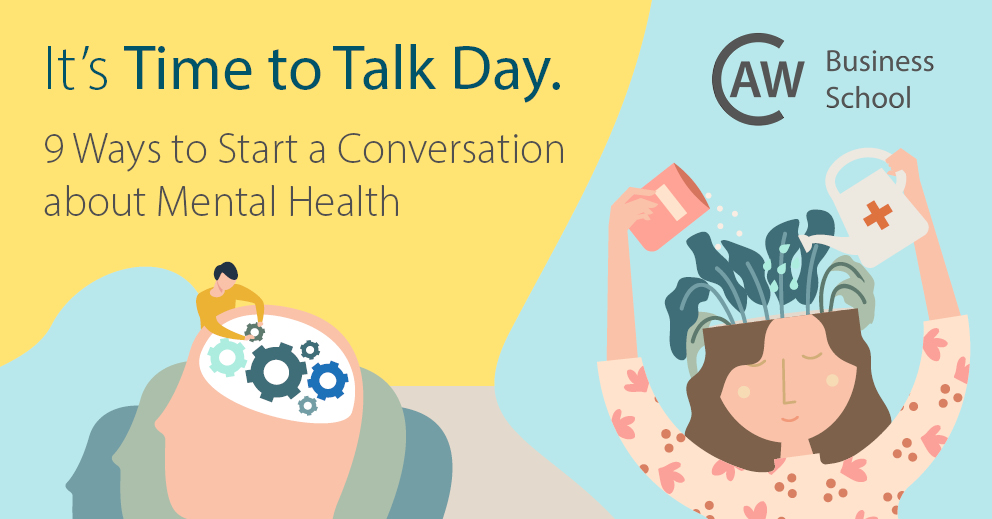9 Ways to Start a Conversation about Mental Health
Posted: 6 February 2020 at 10:27 am | Author: CAW Business School
Today is Time to Talk Day.
Talking has the power to change lives… Mental health problems affect one in four of us, yet too many people are made to feel isolated, ashamed and worthless because of this. But the good news is that this is changing, slowly…
Taking about mental health can feel awkward. Knowing what to say to someone who is struggling isn’t always easy, but what you say doesn’t have to be profound, it should simply be compassionate and show that you care. One of the biggest worries people have is saying the ‘wrong’ thing, but not saying anything or avoiding the person can make them feel even more isolated. If you don’t know what to say, say just that and let the person know that you are there for them.
Read on to discover 9 ways to start a conversation about mental health:
1. ‘How are you feeling?’
One of the simplest ways to start a conversation is to be direct.
2. ‘I care’
These two simple words can mean a lot to someone who feeds the world is against them.
3. ‘I’m here for you’
Depression can be isolating and overwhelming, knowing that you are there for them can be very reassuring.
4. ‘Is there anything I can do to help?’
Are there things that you can do physically or mentally to help ease some pressure? Could you help with shopping or housework, or simply provide some company? The person may be reluctant to accept help for fear of being a burden – make it clear that you want to help, in the same way that they would for you. Be specific, for example, instead of just asking what you can do, ask if you can visit on a Sunday morning to carry out a specific task.
5. ‘Have you told your doctor how you are feeling?’
If the person has not yet seen a doctor, encourage them to seek help, reassuring them that there is nothing wrong with asking for some help.
6. ‘Do you need to talk?’
Sometimes the most important thing you can do is to just listen, sympathetically and without interrupting. A listening ear can help the person to relieve the pressure of their pent-up feelings.
7. ‘I understand’
If you have been through what the other person has, it can be helpful for the person to hear that you have been there and got better. However, you should only do this if you really have experienced the same thing, otherwise you could come across as trivialising the person’s experience.
8. ‘You aren’t weak’
People with depression may feel their depression is a weakness or a character flaw – they must be reassured that this is not the case and that they have an illness that takes a lot of strength to fight, so they are stronger than they think.
9. ‘There is hope’
Reassure your friend that there is hope because mental health conditions are treatable or manageable and they have a very good chance of returning to feeling normal again.
If you are concerned about a colleague or student, please contact a Safeguarding Officer or advice. If you ever believe a person to be in imminent danger, you should call 999.
Further sources of help and support for those struggling with a mental health condition can be found below:
- Anxiety UK
- Bipolar UK
- CALM (Campaign Against Living Miserably – for men aged 15 to 35)
- Mind
- No Panic (for sufferers of panic attacks and OCD)
- Papyrus (Young suicide prevention society)
- Rethink Mental Illness (support and advice for people living with mental illness)
- Samaritans (confidential support for people experiencing feeling of distress or despair)
- BEAT (Beating Eating Disorders)
